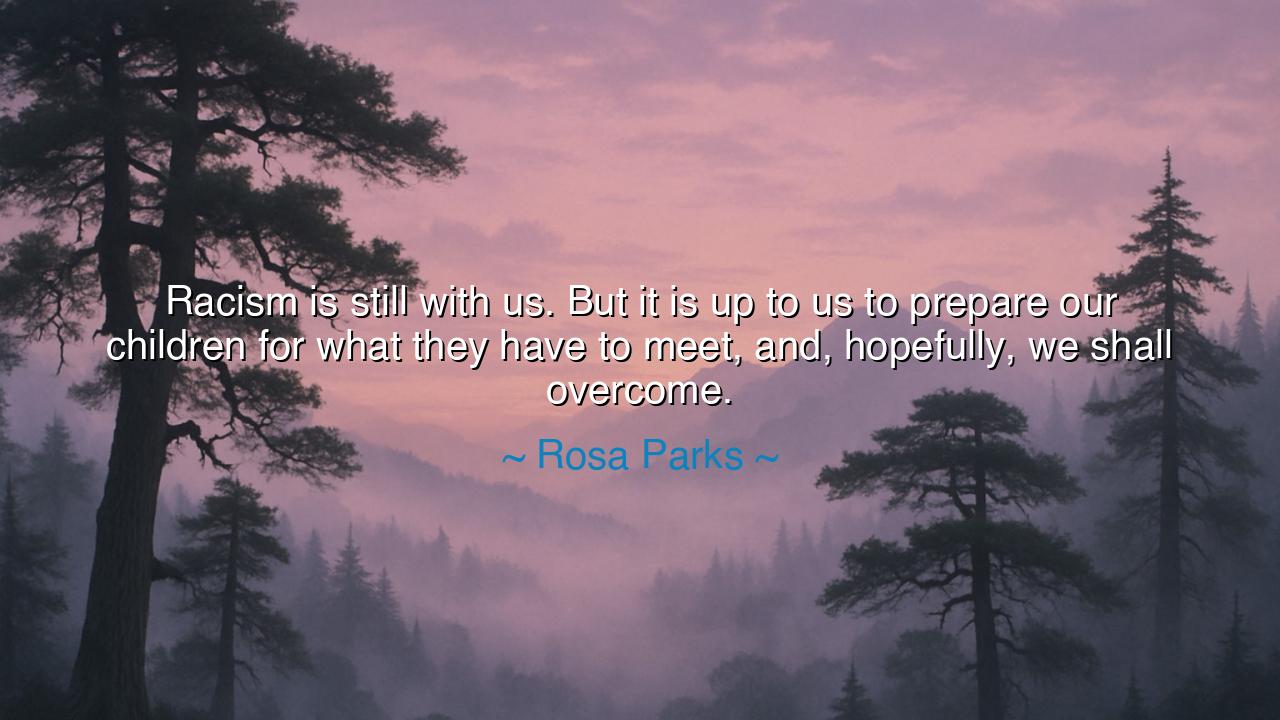
Racism is still with us. But it is up to us to prepare our
Racism is still with us. But it is up to us to prepare our children for what they have to meet, and, hopefully, we shall overcome.






“Racism is still with us. But it is up to us to prepare our children for what they have to meet, and, hopefully, we shall overcome.” These solemn and enduring words of Rosa Parks, the quiet mother of the Civil Rights Movement, carry the weight of both sorrow and strength. They were not spoken in bitterness, but in faith — a faith born from suffering, courage, and the unyielding belief that love and perseverance can outlast injustice. When Parks said these words, she was not merely describing the world as it was; she was calling upon generations to come to stand guard over the progress she and her brothers and sisters had fought so fiercely to win. Her wisdom bridges two worlds — the pain of the past and the hope of the future.
In her words, “Racism is still with us,” Parks acknowledges a truth that transcends her own era. Though laws may change and chains may fall, the shadow of prejudice lingers in the hearts of men. She understood that racism is not merely a system — it is a sickness of the soul, passed quietly from one generation to the next. Thus, she calls upon us to break the chain where it begins: in the minds of our children. To prepare them is not only to warn them of the world’s cruelty, but to fill them with the strength to endure it, the wisdom to confront it, and the compassion to rise above it.
The origin of Parks’ insight comes from her own life — from the long road of struggle that began on a Montgomery bus in 1955, when she refused to surrender her seat to a white man. That single act of quiet defiance ignited a movement that would shake the conscience of a nation. Yet, even after victories like the Civil Rights Act, Parks saw that hatred and inequality were not banished — they merely changed form. She learned that laws may command obedience, but they cannot command love. And so, she turned her hope toward education and the future, knowing that the hearts of children are the soil in which the seeds of justice must be planted anew.
Consider the story of Ruby Bridges, the six-year-old girl who, in 1960, became the first Black child to integrate a white elementary school in New Orleans. As she walked through mobs of screaming adults, hurling curses and threats, she showed a courage that belied her tender age. Behind her bravery was a mother who had prepared her child for what she had to meet — teaching her to pray for those who hated her and to walk forward without fear. Ruby’s steps were the living embodiment of Parks’ message: that the next generation must not only face the hatred of their time but also carry within them the light that outshines it.
Parks’ words also carry a deeper lesson about the nature of progress. Hope alone is not enough — it must be paired with responsibility. Each generation inherits both the wounds and the duties of the one before it. To overcome racism, we cannot simply wait for time to heal what time did not create; we must teach, challenge, and rebuild. True victory lies not in the absence of hate, but in the presence of understanding — in the choice to respond to darkness with light, and to ignorance with compassion.
Her closing words, “we shall overcome,” are more than a phrase — they are a prayer that became a song, a song that became a movement, and a movement that became a legacy. It was sung by marchers crossing the Edmund Pettus Bridge, by prisoners in Birmingham, by students at lunch counters, and by mothers rocking their children to sleep. It carried the rhythm of faith — the belief that no matter how fierce the storm, justice will one day stand in the sun. Parks knew that overcoming does not mean forgetting the past, but transforming its pain into wisdom and its memory into strength.
So let us take the lesson of Rosa Parks as a sacred inheritance: do not despair that racism is still with us, but prepare the next generation to confront it with dignity and love. Teach them history, so they may not repeat it. Teach them empathy, so they may not perpetuate it. And teach them courage, so they may overcome it. For the work of justice is never finished — it passes from hand to hand, from heart to heart, from mother to child. And if we do our part, then one day, as Parks dreamed, the song will not be “We shall overcome,” but “We have overcome.”






AAdministratorAdministrator
Welcome, honored guests. Please leave a comment, we will respond soon